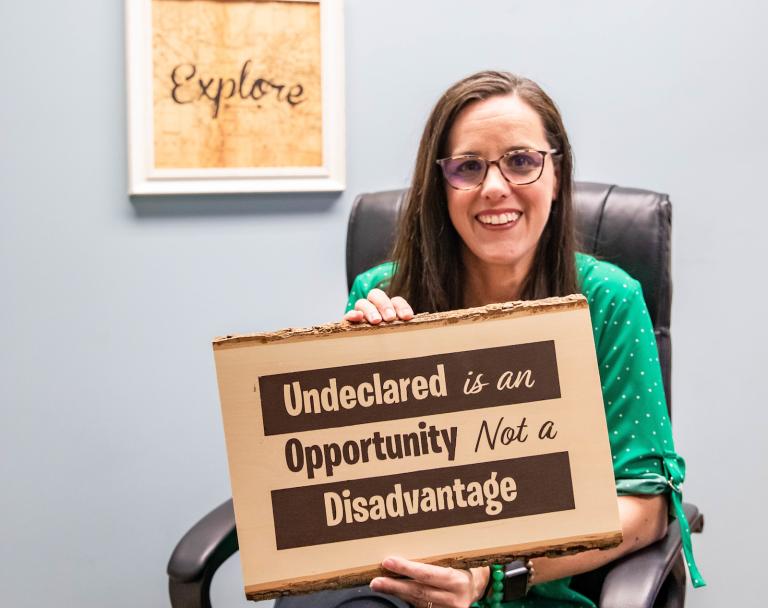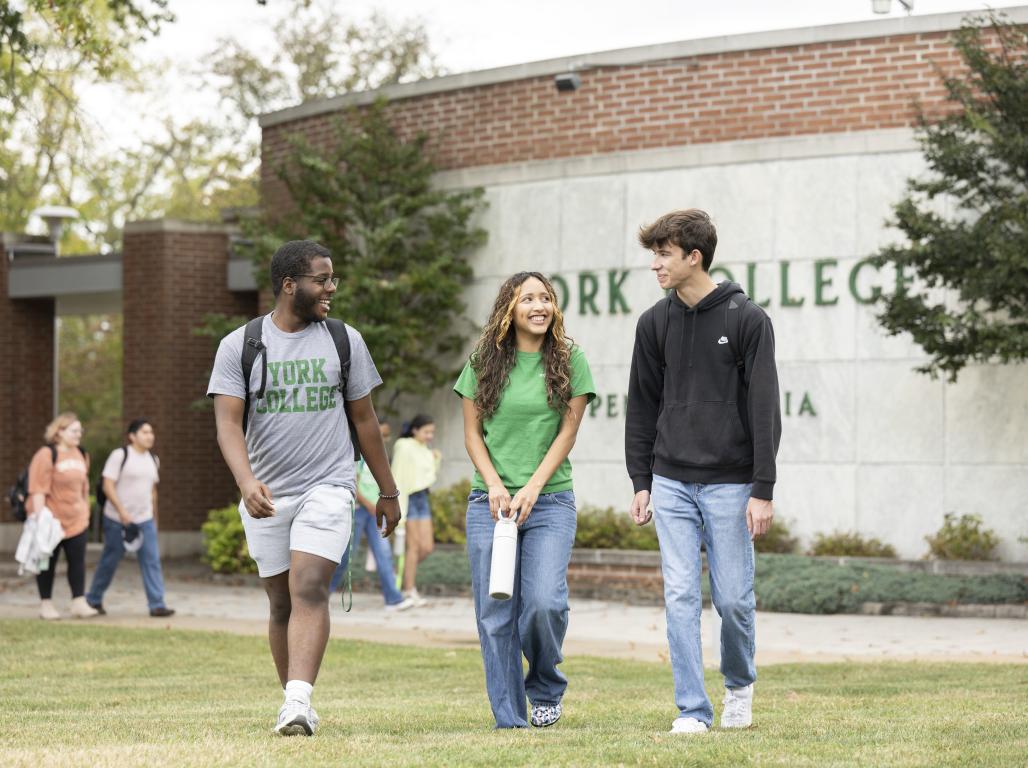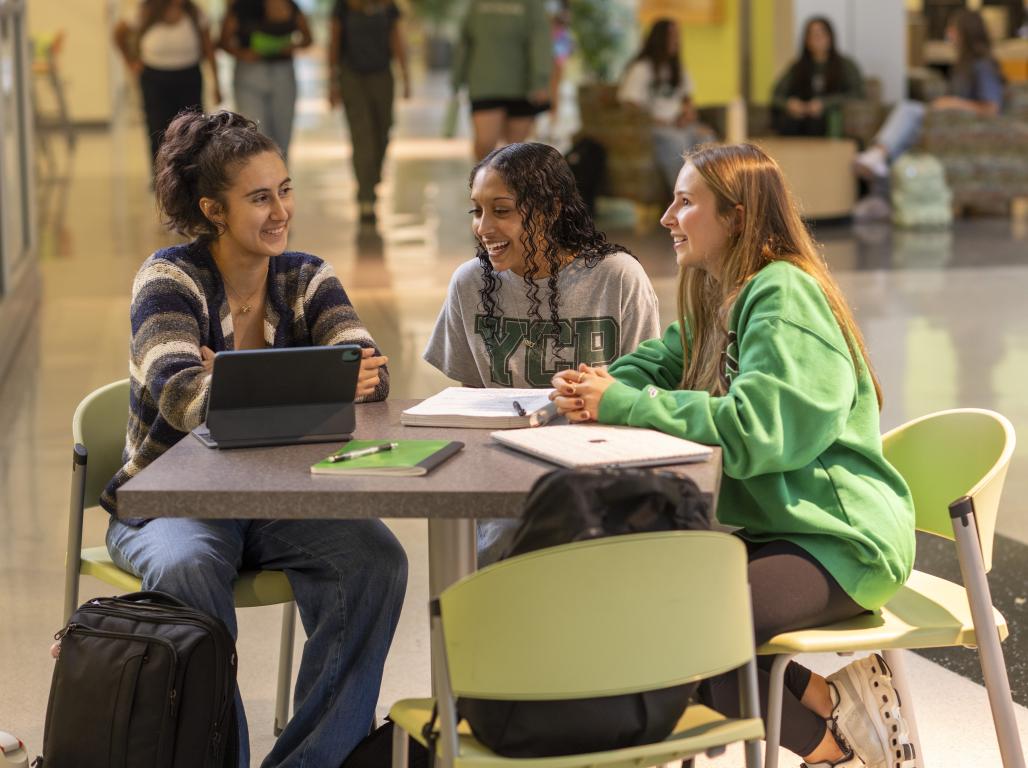Undeclared: Interview With Stephanie Perago, Coordinator of Undeclared Student Advising

I recently had the chance to sit down with Stephanie Perago to discuss her role in the Undeclared program and working with Undeclared students. Stephanie has been the Coordinator of Undeclared Student Advising for nine years.
Can you describe what the Undeclared program does for those unfamiliar with it?
When you come to college Undeclared, you can take some time to be thoughtful and strategic with your course planning. Many students come into college unsure of what they truly want to study, or perhaps do not have a good sense of what major might be the best fit for their interests and academic skill. One misconception is that Undeclared students just take a bunch of general education courses until they declare their major. At YCP, students in declared majors typically have general education courses throughout their four years. So instead of just taking a bunch of random “gen eds,” we strategically like to have students take courses in areas that they would like to explore in addition to taking a few general education options.
When did the Undeclared program first come about?
The College has always had Undeclared students; however, there had not been any formalized structure regarding how this population of student was advised. In 2013, a retention committee had been formed on campus, and one of the areas they highlighted was the fact that we just needed a bit more cohesion to our approach with Undeclared students. Prior to the creation of my current role, Undeclared students were advised by a number of different faculty members and administrators.
In 2014, we decided to centralize the Undeclared program to the Advising Center and have dedicated, professional advisors do the advising. And that was when I came on board full-time to coordinate and oversee those efforts. Now we're headed into year 10 of the program.
How did you come to the Undeclared program?
I like to say that Undeclared advising found me, not that I found it. I had already been advising a small group of Undeclared students for a few semesters in addition to teaching part-time at YCP. So, when the College offered me a full-time job to coordinate the Undeclared Advising program, I said yes.
As far as my career trajectory, after I graduated with my bachelor’s degree, I worked full-time as a high school teacher. Then life changed when I had kids. I shifted to working part-time at the College, while also being a full-time mom. My daughters were in fourth and fifth grade in 2014 (when I returned to working full-time), so I felt that the timing was perfect.
When I interviewed Jacob Carlson, he mentioned how novel the program was at the time, too.
Well, it was for us, at least; I can't say it's novel at other institutions. Like I mentioned, we had a number of faculty and administrators advising Undeclared students, but there was no cohesive approach. I was tasked with coordinating how we advised Undeclared students, making it more strategic and tailored to a student’s academic interests and skill.
Additionally, the Undeclared population accounts for approximately 10-15% of each incoming class, which can be anywhere from 120-140 students. This means that I have 120-140 stories to learn, as each student’s situation is unique. Part of what we do at YCP is we really meet a student where they are and try to make that a personalized experience for each of them.
What are your official responsibilities as Coordinator of Undeclared Student Advising?
I like to say that I get to wear many “hats” working at a small college.
Primarily, I oversee all of the back-end work related to Undeclared advising—so tracking incoming student enrollment numbers, assigning professional and peer advisors to Undeclared students, collecting and assessing data related to major changes—all of that falls on my plate. In addition, I coordinate ongoing training for the professional advisors who work with Undeclared students. We meet once a month during the semester to continue to learn about all of the current and new academic programs that the College offers.
I also advise a good portion of the Undeclared students, helping them to navigate their first semesters of college, while exploring majors.
Each fall I coordinate with the Career Development Center to host our annual Majors & Minors Fair. It is a great event, where all students are invited to talk to faculty and student representatives about the different majors and minors at YCP.
Throughout the spring semester, I hire and train the Peer Advisor (PA) staff. Peer Advisors are student leaders who are trained as para-professional advisors to help us with New Spartan Days, to work in the Academic Advising Center, and are also assigned to a roster of Undeclared students, providing them with thoughtful, student-friendly insights throughout the academic year.
In the summer, I help with New Spartan Days (summer orientation). I coordinate with the Office of Student Activities and Orientation and we train the student leaders that we call Spartan Staff, who assist us during summer orientation. For two weeks from the middle to the end of June, we onboard the entire incoming class of students, advising them and helping them to register for their first semester of classes.
There’s never a dull moment!
When did the Peer Advisors become part of the Undeclared program?
The first group of PAs were hired and started in the spring of 2014. Initially their role was a bit different because we didn't have New Spartan Days. (Summer orientation didn't start until 2016.) Summer orientation really changed the description of what PAs do, because the work in the summer is so important. Then they have office hours in the Academic Advising Center during the semester, and they have regular follow-up with Undeclared students throughout the fall and spring.
Is there anything in particular you’d like to highlight about the program?
I like to talk to prospective families and students about the trained professional advising staff. We are a team of advisors who enjoy working with first- and second-year students and helping them navigate their first semesters of college through guiding, directing, and suggesting. We're not in the business of telling students what they have to do, but instead we like to have developmental conversations with our advisees that allows them to become the owner of their own educational experience.
In addition, the Peer Advisors are incredible. I also like to tell prospective students and families that PAs are what makes us who we are as a program—it’s that strategic, personalized, targeted attention that each student is going to have.
What’s your best piece of advice for new Undeclared students?
The first thing is to breathe. But I'd say that to any incoming first-year student. You do not have to have it all figured out at the age of 18. During your time in college you are going to learn, grow, and come into your own as a person. So, if you are still exploring or deciding on which major to pursue, it is okay.
During your time in college, you're going to start to get involved in those things that matter to you; take courses and do things that interest you, and hopefully, that's around a major that makes sense for who you are. If we can help allay any fears or concerns when it comes to the academic sphere, I'm happy to be a part of that for a student and for their family.




